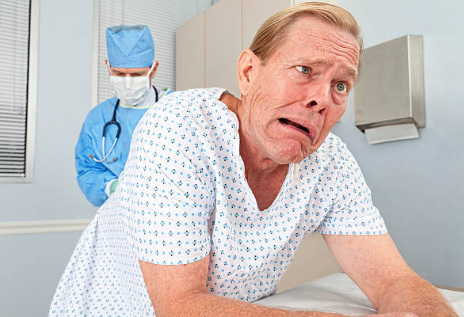Understanding Benign Prostatic Hyperplasia (BPH): Finding Relief for Those Annoying Symptoms
Understanding Benign Prostatic Hyperplasia (BPH): Finding Relief for Those Annoying Symptoms
What is Benign Prostatic Hyperplasia (BPH)?
Okay, let’s dive right in! Picture your prostate as a small gland located beneath your bladder, shaped kind of like a walnut. It’s part of your reproductive system. Benign prostatic hyperplasia (BPH) is simply an enlargement of that walnut-shaped gland. And unfortunately, BPH is pretty common as men age.
What Happens When Your Prostate Gets Bigger
Think of a gradually narrowing water hose. As your prostate grows with BPH, it puts a squeeze on your urethra, the tube that carries urine out of your body. This can give you a frustrating set of symptoms, collectively known as lower urinary tract symptoms (LUTS).
Am I the Only Guy This Happens To?
Nope, you’re in good company! More than half of men over 60 experience some degree of BPH. And hey, by the time you hit your 80s, it’s almost a guarantee that your prostate will have gotten larger.
Why Does BPH Happen?
The exact causes of benign prostatic hyperplasia still have scientists scratching their heads a bit. While it’s definitely related to aging, hormones play a complex role. As you get older, your hormone levels shift, which could trigger prostate growth.
The Pesky Symptoms of Benign Prostatic Hyperplasia
Do these sound familiar?
- Frequent urge to go: Can’t seem to get away from the bathroom?
- Hesitancy: Trouble getting the flow started.
- Weak stream: It’s more of a trickle than a satisfying gush.
- Dribbling: Frustrating drops even after you think you’re done.
- Feeling like you can’t fully empty your bladder
- Waking up multiple times at night to go: Interrupted sleep is no fun.
Don’t Confuse BPH with Prostate Cancer
While the symptoms can overlap, BPH is not cancer. It’s a benign condition, meaning non-cancerous. However, it’s still crucial to see your doctor to rule out any more serious issues.
Can Benign Prostatic Hyperplasia be Cured?
Unfortunately, there’s no outright cure for an enlarged prostate yet. But the good news is there are a whole bunch of ways to manage BPH and keep those aggravating symptoms at bay.
Time for a Doctor Visit
Getting a diagnosis of benign prostatic hyperplasia is essential. Your doctor will chat about your symptoms, likely do a physical exam (including a digital rectal exam – fun times!), and might order some tests. They’re there to help.
The Wonderful World of Benign Prostatic Hyperplasia Treatment Options
So, what can you do about BPH? Let’s explore your choices:
1. Lifestyle Changes: Sometimes the Small Stuff Matters
- Fluid management: Especially cut back in the evenings.
- Bladder training: Try gradually holding it a bit longer.
- Diet watch: Avoid spicy foods, caffeine, and alcohol, as these can irritate your bladder
- Stay active: Exercise is good for everything!
2. Prescription Medications – Let Those Muscles Relax
Don’t worry, there are medications to ease your BPH woes! They belong to a few different classes:
- Alpha-blockers (for benign prostatic hyperplasia): These relax the muscles in your prostate and bladder, making it easier to go.
- 5-alpha reductase inhibitors: These work to shrink your prostate over time.
- Tadalafil: Sometimes used for BPH if you also have erectile dysfunction. Win-win!
3. Benign Prostatic Hyperplasia Supplements (and Other Natural Remedies)
There’s some evidence, though mixed, for a few natural remedies. Always talk to your doctor before trying these:
- Saw palmetto (for benign prostatic hyperplasia): Maybe a bit helpful?
- Pygeum africanum (for benign prostatic hyperplasia): Jury’s still out.
- Beta-sitosterol: A plant-based option.
4. Minimally Invasive Procedures – Going Beyond Medication
If medications or lifestyle changes aren’t enough, your doctor may suggest minimally invasive procedures. These are usually outpatient and have faster recovery than traditional surgery.
5 FAQs distilled from the article:
1. I have some of those annoying urinary symptoms – is it definitely BPH?
Answer: While it’s likely, it’s crucial to see a doctor. Similar symptoms could also indicate prostate cancer or other issues. Only a proper diagnosis can guide the best treatment path.
2. If my symptoms are mild, can I just wait and see?
Answer: Sometimes this is okay, but it’s best to discuss it with your doctor. In some cases, untreated BPH can lead to complications like urinary tract infections or bladder problems. Your doctor can help you monitor your situation and decide if and when to start treatment.
3. Do the natural remedies for BPH really work?
Answer: Results are mixed. Some studies suggest saw palmetto might provide slight benefits, but more research is needed. Always chat with your doctor before starting any supplements, especially if you take other medications.
4. I’m scared of surgery – what else can be done?
Answer: Fear is understandable! Fortunately, there are many minimally invasive procedures now available for BPH. These often have less downtime and fewer side effects than traditional surgery. Your doctor can discuss the right options based on your individual situation.
5. Will I be stuck with BPH forever?
Answer: While there’s no outright cure, various treatments and lifestyle strategies can drastically improve your symptoms and quality of life. Effective management makes living with BPH much less troublesome!

